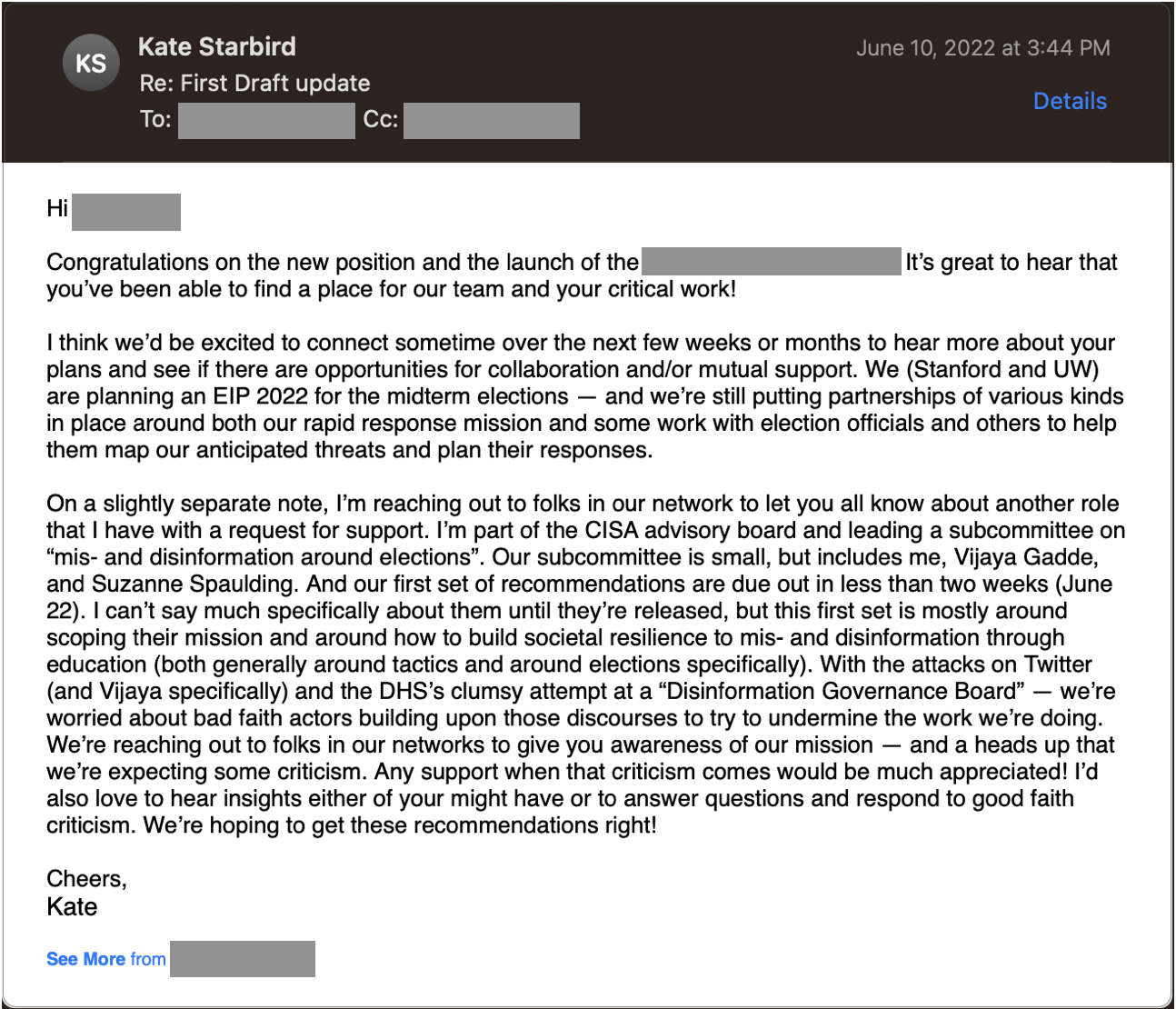“Secret emails" show that… professors at public universities are subject to public records laws.
My name is Kate Starbird and I am a faculty member at the University of Washington. My research program studies rumors and disinformation campaigns, examining how they take shape and spread through online spaces. In recent years, this work has come under attack by individuals and organizations who benefit from the spread of falsehoods and the manipulation of information systems. One dimension of those attacks has taken place through public records requests.
What are public records laws?
As an employee of a public university, my colleagues and I are subject to “public records” laws. These laws compel state employees, including researchers, to provide to requesters any and all public records — including written and digital communications — produced in the course of our work or using equipment provided by our employers. In the state of Washington, there are very limited exceptions, and, quite problematically, these laws were written prior to the era of ubiquitous digital communication and have not been updated to take into account the implications of a changed world, for example the much wider range of a person’s activities that are now recorded, the potential privacy implications of devices that span both work and personal lives (exacerbated by work from home policies during Covid-19), and the extremely low barriers for bad faith actors to access and misuse these records. To drive this point home, any digitally mediated conversation that I or my colleagues have had with colleagues, collaborators, journalists, or others must be provided to anyone who requests it. This includes, among other things, scholarly communication, feedback on research ideas and drafts, deliberation about research designs and preliminary analyses, and even personal updates between colleagues.
How are public records laws exploited in the digital age?
In ideal cases, public records laws provide transparency into the inner workings of government and can be used to hold government accountable. But these laws can also be exploited by bad faith actors to harass government employees, both by siphoning off large amounts of time and resources to fulfill broad requests, and by mischaracterizing and/or weaponizing the documents that are obtained. For example, the requesters can (and often do) selectively “cherry pick” pieces of content, publicize them without their original context, and twist them into false narratives. These false narratives can be used to catalyze harassment against the individuals targeted by these requests.
This problem can be especially acute for university researchers who generate large amounts of digital content through the course of their work, which can be easily misrepresented to audiences that are not fully knowledgeable about the methods of scientific production.
In the last two years, my team and I have received more than 40 requests and have produced tens of thousands of documents. None of these documents provide evidence to support the false narratives that have been levied against our team — for example, there is no record that shows us coordinating with government or social media platforms to “censor” content. However, as these documents are delivered to requesters, not surprisingly, they have all failed to report that the evidence does not support the claims that motivated their search. Instead, we have seen and expect to continue to see them selectively publish pieces of conversations, twisting our words and mischaracterizing their meaning to spawn new conspiracy theories that feed partisan media content-production and social media outrage cycles.
Don't fall for the "secret emails" hype.
Finally, I just want to remind folks that when we see leaked communications, we tend to automatically stigmatize the people who created those emails. But it’s important to remember that for employees of public universities, we provide these records in accordance with the law. They are not “secret documents”. They’re just our emails, Google docs, PowerPoint presentations, and Teams chats. We’re providing tens of thousands of these communications to requestors. The ones that are being published are most likely the “worst” ones that they can find — where a vague meeting request or an ambiguous phrase or joke can be twisted into an existing false narrative or spawn a new conspiracy theory. As a researcher of rumors and disinformation, I know all too well how well this stuff works. I encourage any reader who has come this far to recognize the strategy they are employing.
What's next?
As the university continues to deliver our records according to the laws of Washington State, I hope to use this space to provide some of the missing context to communications that we anticipate will be mischaracterized — and to share some of the communications that we expect the requesters to omit from their accounts.
